The man who kept impending chaos at bay
Updated: 2013-12-17 07:15
By Tom Clifford (China Daily)
|
||||||||
They were fearful days in 1992 and 1993. Nelson Mandela was free but not elected. Apartheid had been scrapped, the 8 pm bullhorn telling blacks to get off the urban streets had been silenced, but civil war seemed a real possibility. Guns were on the streets. At the Star newspaper where I worked in Johannesburg, an empty desk suggested not someone pulling a "sickie" but a probable victim of violence. Before mobile phones were ubiquitous, if someone was missing from work, it was presumed that they had been mugged, or worse. There was a procedure. Colleagues and the HR department would ring friends to check. Then hospitals. Then the police.
Violence was random and common. A taxi driver, dropping me off at Sauer Street where the Star newspaper was located, pulled out a gun as some black pedestrians were crossing the road. He shouted insults at them as they crossed. But the days when blacks were simply intimidated were thankfully drawing to a close. They too had guns, and pointed them at the driver. This was lunchtime, broad daylight. I begged and pleaded with the driver to put his weapon down.
From my desk by a window, I saw three people killed in four attempted bank robberies over a period of two years. The extreme right wing group, the so-called Afrikaner Resistance Movement, known as the AWB, had support among the military top brass. Rumors of military action against the "betraying" de Klerk government were constant.
The black community was also deeply divided, with militant Zulus in Natal taking up arms against the African National Congress.
The tectonic political plates were shifting against each other.
I rented a house in Orange Grove. All the other houses on the street had been broken into. Walking with my partner one day, I saw a man across the street.
"Look," I said, "he has a shirt just like mine."
"Tom, let's talk," my partner said.
Apparently, when I was working nights, Niamh, my partner, was assisting the local black community, giving them clothes, tea and food. We had no weapons in our house, not even a phone. We found out later that instructions had been given not to touch the house of the woman "who gave out clothes".
Then Chris Hani was shot on Saturday, April 10, 1993. It was one of those days when the glorious weather seemed to mock the concerns of mere mortals. Surely something this grotesque could not happen on such a day. Hani was the leader of the Umkhonto we Sizwe, Spear of the Nation, the armed wing of the African National Congress. He was young and charismatic, extremely approachable and was spoken of as a future president.
On that April morning, a Polish immigrant assassinated him, but an Afrikaner woman helped police capture him.
The afternoon and early evening of that terrible Saturday, South Africa seemed destined for civil war. The normally busy streets of Johannesburg were quiet. People were subdued. News reports said that Nelson Mandela would make a televised address to the nation. It already seemed too late to save the day.
But the words Mandela spoke that night on TV helped haul the country back from the abyss.
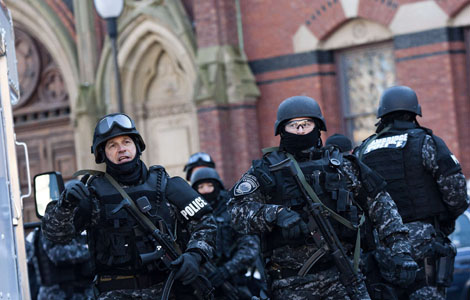
 Harvard reopens after bomb scare
Harvard reopens after bomb scare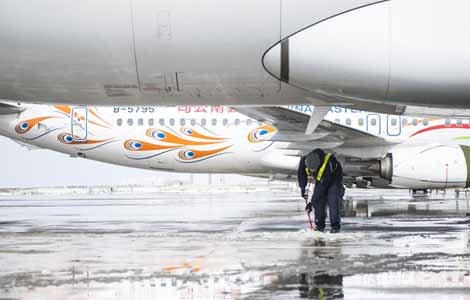
 Snowstorms cause chaos for travelers in Yunnan
Snowstorms cause chaos for travelers in Yunnan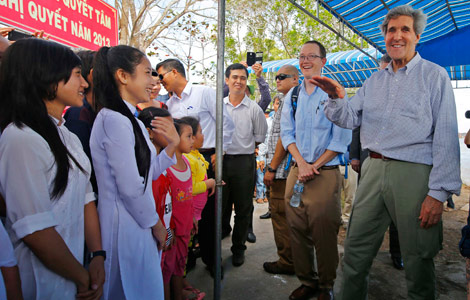
 Kerry offers Hanoi aid in maritime dispute
Kerry offers Hanoi aid in maritime dispute
 Cuddly seal enjoys some me time
Cuddly seal enjoys some me time
 Shoppers dropping department stores
Shoppers dropping department stores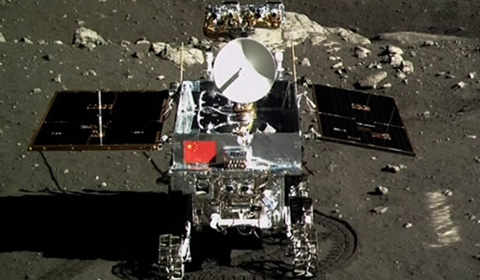
 Moon rover, lander photograph each other
Moon rover, lander photograph each other
 Snow hits SW China's Yunnan province
Snow hits SW China's Yunnan province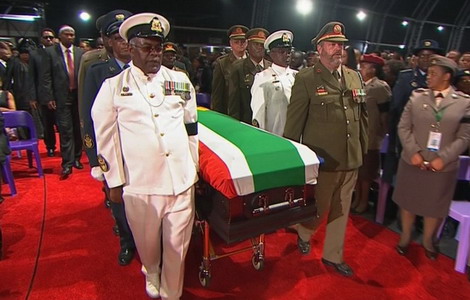
 With a hole in its heart, South Africa buries Mandela
With a hole in its heart, South Africa buries Mandela
Most Viewed
Editor's Picks

|

|

|

|

|

|
Today's Top News
Continuity in DPRK policies expected
China keen on natural gas
China outlines diplomatic priorities for 2014
China's US debt holdings pass $1.3 trillion
Clashes with US can be avoided: FM
Kerry offers Hanoi aid in dispute
14 terrorists killed in Xinjiang
Warehouse fire extinguished
US Weekly

|

|






